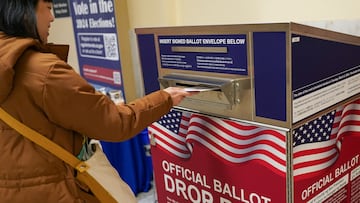Which states vote on Super Tuesday?
Super Tuesday is here, and voters in sixteen states will cast ballots that could cement who should be the presidential nominee for the Democratic and Republican parties.

Super Tuesday is a crucial day in the American political primary calendar.
On Super Tuesday, a large number of states hold primary elections on the same day, which means that a great number of delegates are assigned to candidates that remain in the race. The results of the election event can help candidates recover from deficits from previous primaries or strengthen their lead with little chance of being overtaken. This year, 16 states and one US territory are involved in choosing the favored Democratic or Republican candidate to be at the top of the November 2024 ballot on March 5, 2024. Most states have both party primaries on the same day.
Which states are voting on 5 March?
Voting held for both Democrats and Republicans
- Alabama
- Arkansas
- California
- Colorado
- Maine
- Massachusetts
- Minnesota
- North Carolina
- Oklahoma
- Tennessee
- Texas
- Utah
- Vermont
- Virginia
Just Republicans voting
- Alaska
Just Democrats voting
- American Samoa
- Iowa
The origins of Super Tuesday
The term “Super Tuesday” was first used in the 1980s when several southern states held their primaries on the same day to have more influence in the nominating process. The number of states participating and the timing of Super Tuesday have varied over time. Still, it remains a crucial juncture in the primary season because of the high number of delegates at stake.
What is at stake?
No candidate has emerged as a serious challenger to the incumbent Democratic President Joe Biden, despite concerns from voters about his age and fitness for office. This lack of opposition could pose a problem in November if the latest polls are accurate.
On the other hand, the Republican primaries are slightly more interesting, with Nikki Haley having a final opportunity to challenge Donald Trump for the Republican nomination on Super Tuesday. However, if Trump continues his streak of good results and defeats Haley in the primaries, it could be the end of her presidential aspirations.
Winning the majority of the GOP contests seems unlikely for her, with the only win she has been able to secure being Washington DC. This victory earned her 43 delegates while Trump has already secured 247. Trump is expected to win North Dakota’s caucus the Monday before Super Tuesday, extending his lead before the significant vote on Tuesday.
If none of the candidates get over 60 percent of the vote, North Dakota’s 29 delegates will be distributed proportionately. For a candidate to receive any delegates, they must get over 20 percent of the vote. Trump, Haley, and Florida businessman David Stuckenberg are all on the ballot.





